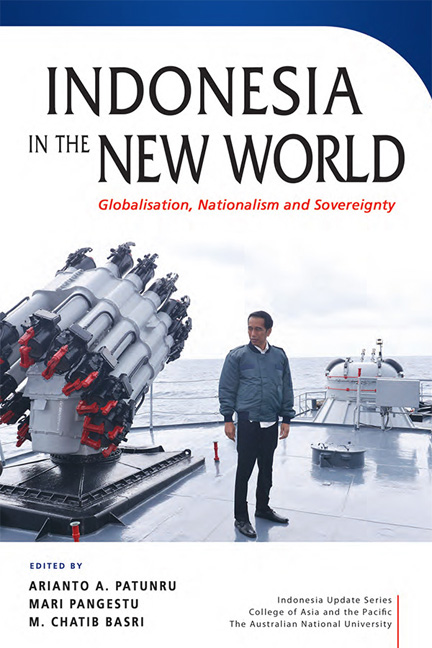Book contents
- Frontmatter
- Contents
- Tables
- Figures
- Contributor
- Acknowledgments
- Glossary
- 1 Challenges for Indonesia in the new world
- PART 1 Globalisation, Nationalism and Sovereignty: the Indonesian Experience
- PART 2 Nationalism in Practice
- PART 3 Impact of and Response to Globalisation
- PART 4 The Human Face of Globalisation
- 11 Globalisation and labour: the Indonesian experience
- 12 Restoring the rights of Indonesian migrant workers through the Village of Care (Desbumi) program
- 13 Globalisation, the role of the state and the rule of law: human trafficking in eastern Indonesia
- PART 5 Navigating The New Globalisation
- Index
- INDONESIA UPDATE SERIES
11 - Globalisation and labour: the Indonesian experience
from PART 4 - The Human Face of Globalisation
Published online by Cambridge University Press: 08 June 2019
- Frontmatter
- Contents
- Tables
- Figures
- Contributor
- Acknowledgments
- Glossary
- 1 Challenges for Indonesia in the new world
- PART 1 Globalisation, Nationalism and Sovereignty: the Indonesian Experience
- PART 2 Nationalism in Practice
- PART 3 Impact of and Response to Globalisation
- PART 4 The Human Face of Globalisation
- 11 Globalisation and labour: the Indonesian experience
- 12 Restoring the rights of Indonesian migrant workers through the Village of Care (Desbumi) program
- 13 Globalisation, the role of the state and the rule of law: human trafficking in eastern Indonesia
- PART 5 Navigating The New Globalisation
- Index
- INDONESIA UPDATE SERIES
Summary
In the current digital era of rapid technological change, globalisation of labour markets deals with a much broader range of issues than simply the effects of international trade and investment on jobs. Historically a major concern of governments, international trade and investment played a major role in job creation across the globe until the global financial crisis of 2007–08. Since then, the links between computerisation and industrial development—or between cyber and physical systems—have intensified, leading to revolutionary changes in modes of service delivery (Baldwin 2016). These developments have changed the nature of the debate on the labour market consequences of globalisation in Indonesia.
The shift in focus away from the labour market effects of trade in goods is partly a result of the slowdown in world trade since the global finan¬cial crisis. This is likely to be exacerbated by the Trump administration's threat to turn its back on the multilateral and regional trading system that has evolved over the past half-century. In addition to the effects of trade, many countries are concerned about the impact of foreign investment on employment, the benefits and costs of international migration and, more generally, the effect of globalisation on inequality (IMF 2007; Helpman 2016). Analysts are increasingly debating the indirect effects of foreign trade and capital movements for the labour market, as well as the direct effects through migration to and from developing countries.
Indonesia became more wary of trade, capital and labour interactions with the world economy after the Asian financial crisis of 1997–98. Restrictions that slowed the growth in trade and investment accelerated during the second term of the Yudhoyono administration (2009–14), as the boom in resource industries peaked and then came to an end (Hill 2015). At the same time, online shopping and other internet-based services spread rapidly in Indonesia, as in the rest of the world. In the Indonesian case, local start-ups such as app-based transport provider Go-Jek have expanded quickly, usually by gaining an initial foothold in Jakarta before moving quickly to other major cities. In the process they have created new job opportunities, while also threatening old ones (Ford and Honan 2017; Pangestu and Dewi 2017).
- Type
- Chapter
- Information
- Indonesia in the New WorldGlobalisation, Nationalism and Sovereignty, pp. 201 - 224Publisher: ISEAS–Yusof Ishak InstitutePrint publication year: 2018

